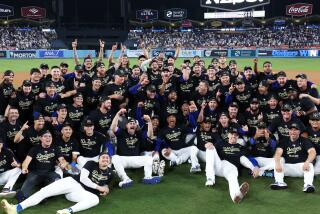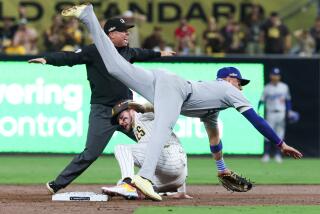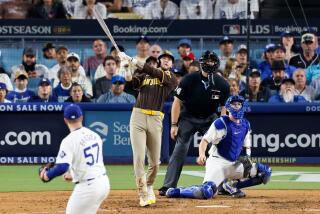Bumbryâs Still Right; but Padres Lose, 6-2
SAN DIEGO â The Padres spent more than a month in Yuma, Ariz., this spring (it only seemed like a year), so it wasnât until their get-away day that team members saw Al Bumbryâs luggage. And one of his bags was worth remembering, only because it was big, bulky and said âBaltimore Oriolesâ on it.
He technically ripped the thing off from the Orioles, his former team, because youâre supposed to return all luggage when you leave an organization. But he had played 12 years in Baltimore, and that apparently entitled him (he says) to take it with him.
Still, the Orioles have said nothing about it, nor are they likely to. Al Bumbry gave them 12 good years, and thatâs good as in not making anyone angry. He was never booed in Baltimore, he says, and thatâs news because Baltimore, being just a few hours south of Philly, knows how to boo.
Reggie Jackson, for instance, was booed badly when he played in Baltimore. Reggie must have said something.
As for Bumbry, he says only positive things, which is probably why it was hard for the Orioles to let him go (he was later signed by the Padres) and why he will be missed by the community there. Al Bumbry, his parents being responsible, learned a long time ago that itâs important not to take anything for granted, important to be nice to people.
âLooking back, my past made me a much stronger person,â he said before the Padresâ 6-2 exhibition loss to the Minnesota Twins Saturday night at San Diego Jack Murphy Stadium.
Since his past has passed, it is naturally much easier to speak about. He was raised in King George, Va., a rural setting 15 miles from the metropolis of Fredericksburg, Va. He was one of nine kids. His mom cleaned other kidsâ homes. His dad was up before the sun, to go to work as a construction man. There wasnât all that much money around.
He remembers that it was fun, that he had a good time growing up. But he remembers that even if his dad wasnât home for dinner on time, he did have to be home, or else heâd be in trouble. His mom was strict. She cleaned up other peopleâs homes, but her children would not run loose, would end up with better jobs.
He learned things. He went to Vietnam in 1969, serving 11 months as a platoon leader before he even knew what platooning was. He must have done something right there because he earned a Bronze Star before being discharged as a 1st lieutenant in May of 1971.
He made it to the big leagues for good in 1973, and he learned things again. Kids would do anything to touch him, would do anything to have him sign their piece of paper. This was strange. Theyâd ask him questions, ask why he wore a batting glove when he ran the bases.
He realized they loved him even though they didnât know him. He figured it was best to be nice to them because his mom had taught him to treat others as they treated you.
âYou know,â he says, âsome kids would give their arms to be baseball players.
âFor me . . . It wasnât easy growing up. I learned to appreciate what I have now. And Iâm more sympathetic to people who donât have it.â
Other ballplayers arenât like this.
âMost are, but they donât show it,â he said.
Heâs always shown it. When heâd go over to pick up the girls heâd take out on dates, the girlâs little sister or brother would love him. He noticed this happened a lot. That told him something.
âIâm good with kids,â he realized.
Soon, he wasnât so good with the bat, not so fast with his feet. Last year, he didnât impress the Orioles, and since he was going on 37, they let him go. He knew something was up last season when a young guy named John Shelby played ahead of him against right-handers who heâd hit very hard before.
âThe Orioles felt I didnât have a year last year that indicated I could produce in the future,â he said.
So they let him go, and said, out of courtesy, that theyâd bring him to camp if he couldnât find a job. Then they went out and signed Fred Lynn.
So he came to San Diego as a non-roster player.
âItâs sort of like Sugar Ray Leonard when he injured his eye,â Bumbry said. âHe felt good and came back when people couldnât understand why. Hey, he just hadnât wanted to retire . . . My competitiveness is still there, just like that. I didnât feel I was ready to retire.â
So heâs here, having made the team as the fifth outfielder. Now that Carmelo Martinez (hand) is injured, Bumbry will platoon with rookie Jerry Davis in left field. Heâs important again. He will start again.
Some nice guys can finish first.
Padre Notes
After Saturdayâs game, Padre Manager Dick Williams said Mark Thurmond will be his fourth starting pitcher, while Dave Dravecky will be his fifth starter. Earlier, it had been vice-versa, and this is a significant change only because the fifth starter will spend the early portion of the season in the bullpen. Pitching coach Galen Cisco explained the change this way: âThe guy (Thurmond) won 14 games for the Padres last year and probably would be less effective out of the bullpen than some other guys. He didnât have an outstanding spring, but we should give the guy a chance to start.â Dravecky shouldnât be perturbed by this, since heâs used to a relieversâ role, much more used to it than Thurmond is. That may have had something to do with this decision, although Cisco didnât say so. . . . Shortstop Garry Templeton was the leadoff hitter Saturday night, as Williams continues experiments there because of Alan Wigginsâ knee injury. Williams said the leadoff hitter for opening day will not be decided until opening day. Speculation: Itâll be either Templeton, left fielder Jerry Davis, infielder Jerry Royster or infielder Tim Flannery. . . . Pitcher Eric Show gave up his first earned runs of the spring Saturday night, including home runs by the Twinsâ Kent Hrbek and Tom Brunansky.
More to Read
Go beyond the scoreboard
Get the latest on L.A.'s teams in the daily Sports Report newsletter.
You may occasionally receive promotional content from the Los Angeles Times.










